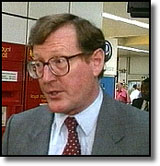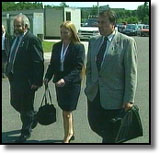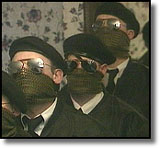
|
Trimble Accuses Government of DuplicityThe leader of the Ulster Unionists, David Trimble, has said the Government is guilty of duplicity over the issue of the disposal of paramilitary weapons.The accusation came as Mr Trimble was preparing for talks on Monday with the Prime Minister, Tony Blair. The talks are the first crucial step in efforts to turn the newly declared IRA ceasefire into a political settlement in Northern Ireland. Mr Blair will urge the Unionists that cross-table talks with Sinn Fein are worth the political risk, even though no timetable has been drawn up for the IRA to hand over its weapons. Mr Trimble alleged that the Government had given the IRA a secret assurance that it would not have to get rid of its weapons during negotiations: "I think that this sort of duplicity, when we're being told or being asked to accept a compromise while other people are being given secret assurances that they won't have to do anything at all, is really not fruitful ..." Mr Trimble says his party "wouldn't rule out" sitting down eyeball to eyeball with Sinn Fein, but only if certain pre-conditions were met. The IRA would have to agree a permanent end to violence and be committed to the democratic process. But he dismissed the latest ceasefire, saying the IRA were telling their people it was "temporary" and would only last a couple of months. And he made clear his party would not be joining the talks with Sinn Fein unless the Government compromised on its weapons decommissioning paper. "I very much hope that they agree to the amendments we propose because they are not radical," said Mr Trimble. "They merely state in unambiguous terms what the Government claims is its own policy." The Unionists have to decide on their strategy by Wednesday, when the Government's proposals for weapons decommissioning are voted on at the multi-party talks at Stormont in Belfast. One of the smaller Loyalist parties, the UK Unionist Party, has announced its withdrawal from the peace talks. Spokesman Robert McCartney said: "We will not negotiate with anyone who supports violence and who are associated with any group which retained the means of inflicting violence upon others for the attainment of political objectives."
Dur. 3'41
"Decommissioning itself has to be a voluntary process, as the calling of the cessation was a voluntary process," said Mr McLaughlin. "Each party will bring their own analysis to the range of constitutional and political matters also." "Sinn Fein's view is that we will have decommissioning as part of a comprehensive negotiated agreement." "It is an incredible decision to adopt that the peace process is over because the IRA has called a cessation."
A group of party officials arrived for a series of preliminary meetings and were shown by senior civil servants to their office at Castle Buildings where the discussions on Northern Ireland's future are taking place. Sinn Fein insists its representatives at Stormont will be available immediately for bilateral discussions. But the group will not be permitted to join the talks proper until a six-week quarantine period guarantees that the IRA ceasefire is solid. Meanwhile the Irish Republican Socialist Party, the political wing of the INLA paramilitary group, has rejected the ceasefire, saying it won't help bring about a united Ireland. In a statement issued on Monday, the group hinted that the INLA might continue its campaign of violence.
|
Diana, Princess of Wales, 1961-1997
Conference 97
Devolution
The Archive
News |
Issues |
Background |
Parties |
Analysis |
TV/Radio/Web
Interactive |
Forum |
Live |
About This Site
News |
Issues |
Background |
Parties |
Analysis |
TV/Radio/Web
Interactive |
Forum |
Live |
About This Site
© BBC 1997 |
politics97@bbc.co.uk |


